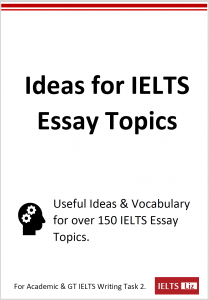Below is an IELTS speaking part 1 topic currently being used in the IELTS test this month. It is a new topic and has been taken from the main topic of Food.
I’ve listed the questions and provided some model answers and vocabulary. You can find more current speaking part 1 topics listed below.
Chocolate: IELTS Speaking Part 1 Topic
Questions with model answers:
- Do you like chocolate?
- Yes, I do. I like both blocks of plain chocolate as well as chocolate bars, such as Mars bars.
- Do you often eat chocolate?
- Unfortunately, yes I do. I eat it everyday even though I know I shouldn’t.
- Is chocolate popular in your country?
- Yes, it’s extremely popular, almost everyone eats chocolate. It’s probably the most common snack for children and adults, and certainly much more popular than fruit.
- Did you eat chocolate when you were a child?
- Yes, I did but I didn’t eat it as often as I do now as an adult. My parents were careful to ration the chocolate to twice a week only.
- Are there any occasions when people give chocolate as a present?
- Yes, there are a number of times in the year when that might happen. Some people give chocolates to each other on Valentine’s Day, while other’s give it at birthdays. Easter is also a common date to give a chocolate egg as a gift.
- Do you think it is healthy to eat chocolate?
- Not really. I’ve heard that if the chocolate is plain, without added milk or sugar, it is fine to eat a small amount each day but it’s certainly unhealthy to eat the quantities and types of chocolate that most people eat today.
Other Current Speaking Part 1 Topics
- Colour
- Hats
- Mobile Phones
- Weather
- Art
- Gifts
- Walking
- Flowers
- Singing
- Advertisements
- Phototgraphy
- Transport
Also check the common Speaking Part 1 Topics which are also being used:
Speaking Part 1 Topics Commonly Used
You can get more tips for IELTS Speaking and more Model Answers on the Main IELTS Speaking Page of this site.
Main IELTS Pages
Develop your IELTS skills with tips, lessons, free videos and more.





